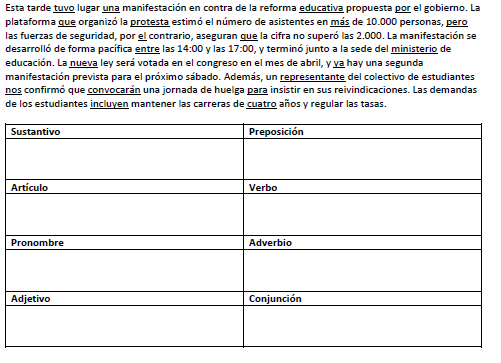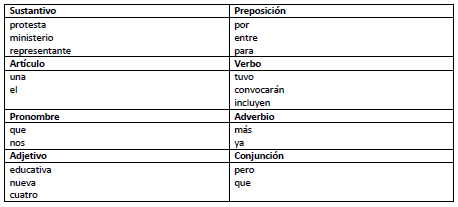Distribuya las palabras subrayadas en las categorías correspondientes.


You might also like to view...
Professor Pantet is asking one of his students about today’s date and the days of the week. You will hear their conversation in French twice. The first time, listen for general meaning. The second time, write “V” (vrai) or “F” (faux) for “true” or “false.”
SPEAKER 1: Bonjour Vincent, c’est le 15 septembre? SPEAKER 2: Oui, Professeur, c’est le 15 septembre. SPEAKER 1: Bon, le 15 septembre… Et c’est quel jour, Vincent? Mardi? SPEAKER 2: Ah non, Professeur! C’est demain, mardi. SPEAKER 1: Ah bon? Alors, c’est lundi. SPEAKER 2: Oui, c’est lundi, le 15 septembre et demain, c’est mardi. Professeur? SPEAKER 1: Oui, Vincent? SPEAKER 2: Je m’appelle Marc! SPEAKER 1: Ah oui! Merci! 1. frère a. ________________________________________________________________ b. ________________________________________________________________ 2. mère a. ________________________________________________________________ b. ________________________________________________________________ 3. père a. ________________________________________________________________ b. ________________________________________________________________ 4. mMari ____________________________________________________________________
Complete the paragraph with adverbs in the –mente form based on the adjectives in parentheses.
Cuando mis abuelos eran jóvenes, no tenían tantas presiones como tenemos nosotros hoy. No había muchos coches en las calles y podían llegar a clase _______________1 (puntual). Cuando terminaban sus clases salían __________________2 (inmediato) y volvían a casa ___________________3 (rápido) para comer con la familia. Por la tarde hacían sus tareas ___________________4 (tranquilo) porque no tenían que trabajar. Después llamaban a sus amigos por teléfono para salir a algún lugar. Creo que se divertían ___________________5 (constante) porque no estaban estresados con la vida que llevamos hoy.
Choose the past tense form of the verb to complete the sentence: He (lay, laid)
his keys on the counter when he returned from the mailbox. a) lay b) laid
Aquí podemos nadar (to swim): _____________________
Provide the names of the most logical parts of the house or pieces of furniture. Include the article.